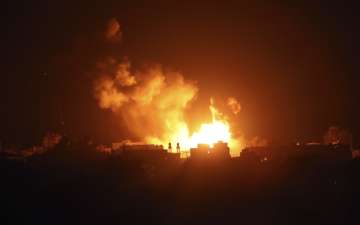Jordan airdrops humanitarian aid in Gaza with help from US, Israel as bombardment intensifies
Jordan reportedly coordinated with the United States and Israel to conduct the airdrop in Gaza. Although humanitarian aid has been allowed through Rafah border crossing, UN agencies said that they are not enough to handle the current crisis after Israel's besiegement of the Strip.

A Jordanian military aircraft airdropped desperately-needed humanitarian aid in the besieged Gaza Strip, potentially marking the first time the Kingdom, which is a key US ally that shares a peace deal with Israel, has done so.
https://twitter.com/KingAbdullahII/status/1721301905731633533
"Our fearless air force personnel air-dropped at midnight urgent medical aid to the Jordanian field hospital in Gaza. This is our duty to aid our brothers and sisters injured in the war on Gaza. We will always be there for our Palestinian brethren," said Jordan's leader King Abdullah II on social media platform X.
According to the Times of Israel, Jordan's airdrop was coordinated with the US and Israel, said a US official familiar with the matter. The airdrop was reportedly conducted as Jordan's field hospital was running on medical supplies.
Jordan’s military said in a statement that the medical supplies were dropped via parachutes from a Jordanian Air Force plane. It has been difficult to consider alternative plans due to Israel's siege and intense bombardment of the Strip.
Israel has cut off water, fuel and medical supplies to Gaza as part of its "complete siege" of the territory since the Hamas attack on October 7. Although humanitarian aid has been allowed through the Rafah border crossing with Egypt, the United Nations has warned that it is not enough to keep up the ongoing crisis.
Jordan calls for a ceasefire
Jordan earlier recalled its ambassador to Israel as bloodshed continued for nearly a month after war broke out between Israel and Hamas last month. Jordan’s Foreign Minister Ayman Safadi said Arab countries want an immediate cease-fire, saying “the whole region is sinking in a sea of hatred that will define generations to come.”
This came during US Secretary of State Antony Blinken's meeting with Arab foreign ministers in Jordan on Saturday after talks in Israel with Prime Minister Benjamin Netanyahu, who insisted there could be no temporary cease-fire until all hostages held by Hamas are released.
Blinken said, “It is our view now that a cease-fire would simply leave Hamas in place, able to regroup and repeat what it did on Oct. 7,” when the group launched a wide-ranging attack from Gaza into southern Israel, triggering the war.
The Arab states have thus far resisted American suggestions that they play a larger role in the crisis, expressing outrage at the civilian toll of the Israeli military operations but believing Gaza to be a problem largely of Israel’s own making.
Meanwhile, Jordan's Queen Rania said that the rejections of a ceasefire in Gaza are "morally reprehensible" and need justification for the deaths of thousands of civilians. "If we do not address these root causes, then you can kill the combatants, but you cannot kill the cause. Under the rubble of these destroyed buildings will emerge another group more determined, and more motivated to do what Hamas did," she added.
Situation in the Gaza Strip
As the Israel-Hamas war continues for nearly a month, the Gaza Strip lost communications for the third time as the military said that it had completely surrounded Gaza City and divided the Strip into two.
"Today there is north Gaza and south Gaza," said Israel Defence Forces (IDF) spokesperson Daniel Hagari, adding that Israeli troops are expected to enter Gaza City within 48 hours. Prior to that, Israeli airstrikes hit two refugee camps, killing at least 53 people and wounding dozens in central Gaza.
Meanwhile, the World Health Organisation (WHO) has said that it is "very concerned" about reports of another communications outage in Gaza."Without connectivity, people who need immediate medical attention cannot contact hospitals and ambulances. All channels of communication must be restored immediately," said WHO director-general Tedros Adhanom Ghebreyesus.
Meanwhile, the US military has acknowledged positioning a nuclear-capable submarine in the Middle East. Central Command separately released an image of a nuclear-capable B-1 bomber also operating in the Mideast on Sunday.
Several UN agencies and humanitarian organisations have jointly called for an immediate ceasefire in Gaza and the swift entry to Gaza of food, water, medicine and fuel. They said that more than 23,000 injured people need immediate treatment and hospitals are overstretched.
(with inputs from agencies)
ALSO READ | Israel PM Netanyahu suspends far-right minister after he suggests dropping nuclear bomb on Gaza